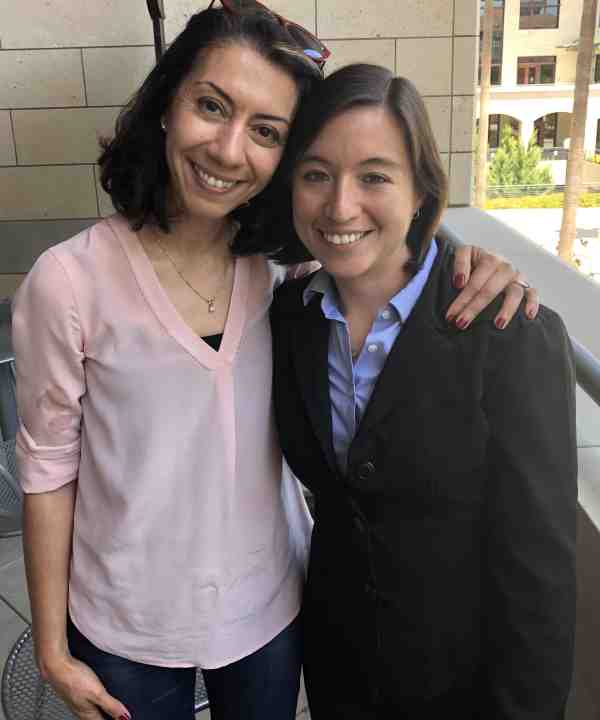August 30, 2018 | Water in the West | Insights
Earlier this week, the American Geophysical Union profiled Newsha Ajami in a piece dedicated to celebrating the achievements of prominent women in science and science policy. Here at Water in the West, we couldn’t be happier about that well-deserved recognition. Ajami’s litany of professional achievements speak for themselves: she is the Director of Urban Water Policy at Water in the West and NSF-ReNUWIt, teaches in the public policy department and serves as a gubernatorial appointee on the Bay Area Regional Water Quality Control Board. But beyond these impressive accomplishments, at Water in the West and Stanford Newsha has also shown an intense dedication to developing and mentoring the generation of scientists, engineers and policy-makers following in her footsteps.
In any profession, mentorship is a critically important component of success. In science and engineering, the profound impact that good mentorship can have on success is even more pronounced, particularly for women. Ajami often mentions the importance of strong mentorship in her career and says that it often comes from more than one person, explaining that she is thankful for the “collection of people who were important in my life from a professional standpoint.” Her master’s degree and Ph.D. advisor, Soroosh Sorooshian of UC Irvine, stands out for Ajami as someone who always modeled “putting his students and staff first. He always made time for his students despite his busy schedule.” Ajami has carried forth in that tradition of support and reliability, Sorooshian notes, saying that “her sense of loyalty towards her senior as well as junior colleagues is what I admire most about her.”
Bruce Cain, Professor of Political Science at Stanford University and The Spencer F. and Cleone P. Eccles Family Director of the Bill Lane Center for the American West, also admires Ajami’s commitment to students. Cain praises Newsha’s genuine dedication to students and unflagging commitment to success, writing that “her advice is wise, her concern for student well-being is genuine and the result in terms of her students' growth and development speaks volumes.”
When asked about what motivates her to go above and beyond to develop good and supportive relationships with those she works with, Ajami explains that it springs from a desire to see people happy and thriving, “it creates an environment for success”. This genuine care for her students’ emotional, social and professional well-being is noted by many of Ajami’s former students and advisees. Marilynn Alvarado, a former student in Ajami’s Public Policy Senior Practicum at Stanford, says she most admires Ajami’s “careful attention to each student as an individual.” In another nod to the power of Ajami’s approach to mentoring in combination with her enthusiasm for interdisciplinary research, Kim Quesnel, a Ph.D. candidate in Civil and Environmental Engineering who works with Ajami, explains: “I am continually impressed not only by her technical expertise but also by her tenacity in making sure that every single student she works with succeeds in a way that best fits them individually.”
What’s clear from these conversations is that for Ajami, mentorship doesn’t end after a weekly check-in or at the close of lab meeting. There is, she explains, no secret recipe for good mentorship: it takes time, energy and genuine concern for the professional and personal well-being of others.
“It’s not just how many papers each student can publish,” explains Ajami of her personal philosophy about developing the next generation of researchers. “It’s making sure that they are motivated and engaged and are reaching their potential. And that takes time because then you have to invest in each individual’s social, emotional and professional wellbeing and you have to pay attention to their professional aspirations and the challenges they are facing.”
Another hallmark of Ajami’s approach is her patience and attention to the inevitable roadblocks, setbacks and frustrations that come in research and policy work. “I always think about how I can help my team overcome their frustrations and hurdles,” explains Ajami.
One of Ajami’s former students, newly minted Ph.D. Patricia Gonzales, explains how Ajami’s approach to overcoming challenges as a team has influenced her research and her career: “I am especially grateful for her enthusiastic attitude towards overcoming challenges. Her patience and determination tend to rub off on her students, whether that’s as part of the research process or navigating a career as a woman in science and engineering.”
At multiple levels and a variety of institutions, Newsha Ajami has blended her technical capabilities with a strong desire to develop and support the generation of scientists—and in particular, women scientists—following her. She is hopeful that this dedication to mentorship will propagate in the future, explaining, “you can model these values for the people you are working with and then trust that they spread the same culture and behavior.”



![[Woods Logo]](/sites/default/files/logos/footer-logo-woods.png)
![[Bill Lane Center Logo]](/sites/default/files/logos/footer-logo-billlane.png)